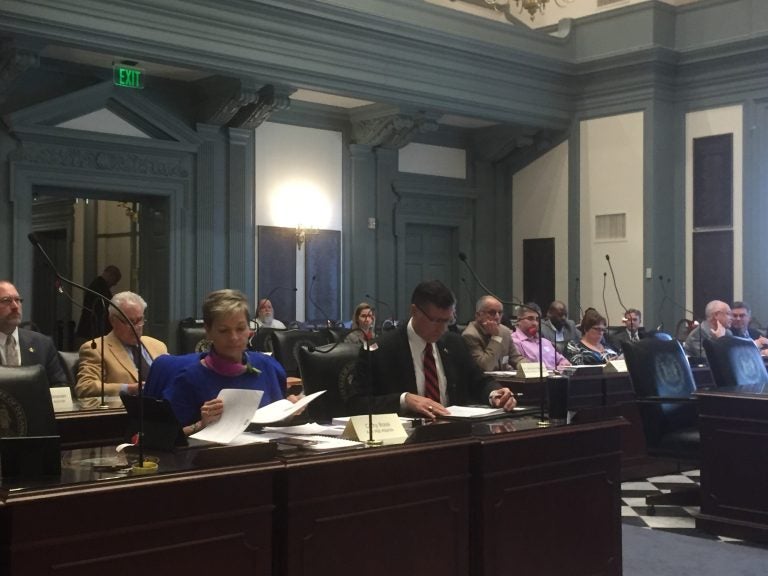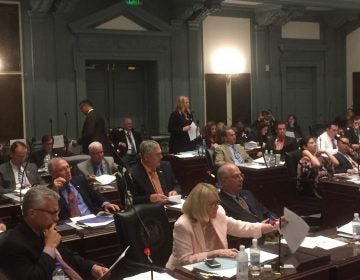Confusion and disagreement cloud Delaware cannabis report
Confusion and disagreement linger over the final report of a Delaware task force assigned to compile opinion and research on recreational marijuana legalization.

A cannabis task force voted to release a report on legalization. (WHYY/Zoe Read)
Confusion and disagreement linger after a Delaware task force assigned to compile opinion and research on recreational marijuana legalization took a vote to release a report to the General Assembly.
The group met Wednesday to vote on a final draft of a report to be released to legislators. The report was meant to ease minds about passing a legalization bill introduced by state Rep. Helene Keeley, D-Wilmington, and state Sen. Margaret Rose Henry, D-Wilmington.
After some questions, the task force voted to release the report on the condition they reconvene next week to address and approve technicalities in the language.
Or so task force members thought.
After adjourning the meeting, it was discovered the vote was incorrectly tallied, and it in fact failed.
After being informed of the mishap, Keeley said a vote isn’t needed for the task force to meet next week. She also said if legislators ask to see the report, they can still view it without a task force vote.
“I will adhere to my word and have this meeting next week so every member can see accurately what was said today and reflect it during the hearing so they feel comfortable any [legislative] member that requests a copy of the report will accurately see what was said and heard today, as well as the minutes, as well as the report,” Keeley said.
Last year, a legislative committee advanced her legislation to legalize recreational cannabis for those over 21, but it never went to the floor for a vote.
The law as written would regulate and tax cannabis much like alcohol. Individuals would be prohibited from operating a vehicle under the influence, carrying it across state borders and growing or creating products on their own, and companies would still be allowed to drug test employees.
Proponents say cannabis has medical benefits, creates jobs and boosts the economy. Advocates say legalization in Delaware would bring in an estimated $22 million in taxable revenue. Keeley’s current legislation would tax marijuana at $50 and it would cost buyers about $200.
Those in favor of legalization argue criminalizing marijuana creates a dangerous illicit market and causes unnecessary arrests of non-violent offenders, often with a racial bias.
While the bill has several supporters, many lawmakers believe too many safety and regulatory issues surround legalization.
Throughout his campaign, Gov. John Carney, D-Delaware, also said he wasn’t on board with legalization. Last year, he met with advocates to hear their point of view.
Carney hasn’t said if he would veto a bill if it landed on his desk. However, earlier this month he told WHYY he’s still opposed.
“I just don’t think we ought to be a leader there,” Carney said. “Again, as we’re trying to strengthen our workforce, create an environment where companies can be successful to make Delaware stronger, I don’t think that will do it.”
Last year, Keeley introduced a resolution creating the 25-member task force, which was given the responsibility of researching the pros and cons of the legislation and to discuss how to address issues like impaired driving and tax structure.
During Wednesday’s meeting, some members expressed their disagreement with some of the language of the draft report. Others wanted assurance information not included in the 15-page report itself, such as testimony, would be available for the General Assembly and the public.
Tim Holly of the Delaware State Chamber of Commerce said he wouldn’t vote on the report unless it makes clear that while it reflects the business conducted by the task force, it does not contain approved actionable solutions and that members are not necessarily endorsing the bill by approving the report.
The meeting next week was scheduled to address technicalities in the language and so members could view additional information that will be available to legislators and the public electronically.
However, task force member Cathy Rossi of AAA still believes the report lacks the breadth and depth required by the resolution, which requires “recommendations and actionable solutions.”
“I understand these meetings aren’t meant to be perpetual in nature,” she said. “I also feel we have a responsibility to put forward a report that provides the cost and consequences of possible implementation, and I’m not sure we’ve done that.”
Henry and Keeley argue the resolution simply requires the task force to outline the issues, and that their amended bill would include actionable solutions reflecting what the task force discussed.
“This is not about passage of the bill at all. It was to look at some of the issues we would consider. I don’t think it was ever meant to be a bible on how to do HB 110,” Henry said. “I think we met our charge, quite frankly. I think at this point we need to take some action.”
The bill sponsors said the task force could meet for years if they kept adding more information to the report.
“I’m feeling like it’s a delay, delay, delay,” Keeley said.
The lawmaker said she hopes next week’s meeting will address those concerns, but there’s still some disagreement on if the failed vote allows it to take place.
A House attorney said the task force is not a legislative committee and the report is not a piece of legislation and therefore doesn’t need a vote to hold a meeting next week. She and Keeley agree if any member of the General Assembly wants a copy of the report it will be available for them, despite Wednesday’s failed vote.
Rossi said she believes the resolution requires task force members to agree on a release of the report but doesn’t know what the rules are as far as allowing legislators to see the report as a draft.
State Rep. Stephen Smyk, R-Milton, also said he’s not confident with the notion the vote is not required.
“If they release it, it’s going to be met with some resistance,” he said.
“If my motion failed they don’t have to call a meeting next week. We never voted on releasing the report as is. The vote was to release pending next week’s meeting.”
WHYY is your source for fact-based, in-depth journalism and information. As a nonprofit organization, we rely on financial support from readers like you. Please give today.





